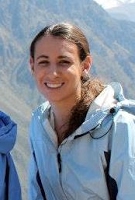Leah Wibecan

Leah Wibecan is a second-year student at Harvard Medical School. She spent the summer working with Partners in Health Rwanda on neonatal health. As an undergraduate at Yale University, Wibecan studied cognitive science and conducted research on the cognitive abilities of non-human primates. She credits her internships -- one at a children’s hospital in South Africa and the other at a reproductive health organization in Uganda -- with sparking her passion for addressing health care inequities. In addition to those experiences, Wibecan has also worked as an assistant preschool teacher.
Before starting medical school, Wibecan spent a year living in Koungheul, Senegal, where she conducted research on health-seeking behaviors and barriers to health care for young children. She hopes to continue working in communities in Senegal (her conversation Wolof skills are helpful for this) and other parts of sub-Saharan Africa to reduce the heavy toll of disease on maternal and child health and to improve access to high-quality health care.

Project: "Formative Evaluation of a Neonatal Follow-Up Clinic in Rwanda"
June 16, 2013 - August 3, 2013
Kayonza District, Rwanda
What does the Kean Fellowship mean to you?
My project through the Kean Fellowship has provided me with an incredible and unique opportunity to learn about and contribute to important work going on in tropical medicine in Rwanda. The Neonatal Mortality Reduction Initiative at Partners In Health Rwanda in an important project that has the potential to make a difference in the lives of many families, and to provide a model for the scale-up of such a program to a national scale. Neonatal mortality has remained stubbornly and unacceptably high in Rwanda despite improvements in child health statistics, and it is clear that a novel approach will be necessary to keep infants healthy in the early weeks of life. The Kean Fellowship is an opportunity for me to delve deeply into this difficult problem in Rwanda, and to learn about the many factors that contribute to neonatal mortality and how to approach them. This is also an opportunity for me to work with Partners in Health and to learn more about the organization’s strategies for tackling challenging health issues in developing regions. I am looking forward to having this chance to learn both about the factors that are essential to the design and implementation of successful health interventions and about the challenges that such interventions face.
What do you anticipate learning?
Through my project with Partners In Health in Rwanda, I have been learning a great deal about the health problems that populations face in this region and the factors that determine the success of programs that target these health issues. Tropical medicine is a field in which a one-size-fits-all approach is rarely successful – tackling malaria in Senegal, for example, will take entirely different strategies than addressing even the same disease in China or in Guatemala. This project is an opportunity to learn about the unique challenges that communities in East Africa face and the disease burdens that affect populations in this region, and to understand how reducing the toll of disease in this region may require distinct strategies considering the particular health and socioeconomic situation. Additionally, this project will allow me to delve into a research topic – neonatal health. Promoting neonatal health relies on many factors that include ensuring the health and well-being of the mother as she approaches delivery, having the necessary health systems in place for pregnancy, delivery, and following birth, and supporting parental knowledge of neonatal health as well as their ability to access health services for the infant when necessary.
What interests you about tropical medicine and what problems are you interested in solving?
While working in developing regions of sub-Saharan Africa, I have witnessed the incredible and disproportionate toll of disease on these populations. I have become particularly passionate about issues of maternal and child health, as I have seen how socioeconomic factors and insufficient access to services have played a particularly devastating role in the health of women and children. Whether I was working with a mother who had only enough money to get medical services for her severely ill sister or daughter but not both, with a woman who wanted to stop having children but could not access family planning services because her husband refused, or with a child whose mother had fed her an entire bottle of cough syrup at once because the nurse had poorly explained the directions – I have seen the vast range of factors beyond the biological mechanism of disease that affect the health of mothers and children in sub-Saharan Africa.
As a medical student, I hope to gain the knowledge and skills to provide direct care for patients and make a difference in their lives. I hope to focus on maternal and child health through a public health perspective to reduce obstacles to good health. I plan to obtain a Masters in Public Health in addition to my medical degree, in order to have the knowledge and experience necessary to make a difference through population-level health interventions, in addition to helping individual patients as a physician. As a doctor involved in public health projects, I will be able to make the most difference in the health of disadvantaged populations in the communities that I have come to care deeply about in Africa as well as at home in the United States.